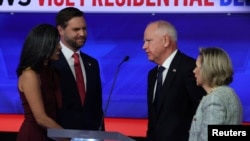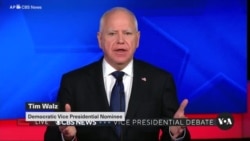Democratic vice presidential candidate Tim Walz and Republican candidate JD Vance clashed on a range of policy issues Tuesday, including gun control, abortion and the spiraling violence in the Middle East, as they faced off in a debate in New York.
Walz, the governor of Minnesota, questioned Republican presidential candidate Donald Trump’s fitness for leading the country and criticized the former president for his 2018 decision to withdraw the United States from the international agreement that put limits on Iran’s nuclear program.
“What’s fundamental here is that steady leadership is going to matter,” Walz said. "And the world saw it on that debate stage a few weeks ago, a nearly 80-year-old Donald Trump talking about crowd sizes is not what we need in this moment.”
Vance, a U.S. senator from Ohio, countered that Trump, during his time in the White House, created “effective deterrence” and made countries afraid to step “out of line.”
"As much as Governor Walz just accused Donald Trump of being an agent of chaos, Donald Trump actually delivered stability in the world," Vance said.
One of the sharpest exchanges came on the topic of the 2020 election, which Trump lost to President Joe Biden. Trump has repeatedly asserted that he won, and his supporters stormed the U.S. Capitol in January 2021 to disrupt the certification of the election results.
Walz said Tuesday that what happened after the 2020 election was an unprecedented “threat to democracy” and that what a president says matters. He pointedly asked Vance if Trump lost the election, to which Vance responded, “I’m focused on the future.”
“That is a damning non-answer,” Walz said.
Vance said Trump peacefully transferred power on inauguration day and said the threat to democracy in the United States is the threat of censorship. He said Vice President Kamala Harris, the Democratic presidential candidate, has engaged in censorship “at an industrial scale,” including seeking to silence social media criticism of COVID-19 policies.
Vance also criticized Harris for not taking action during her time in the White House on issues she says she wants to address.
"If Kamala Harris has such great plans for how to address middle-class problems, then she ought to do them now — not when asking for promotion, but in the job the American people gave her 3-1/2 years ago," Vance said.
Walz responded by pointing to who has the power to set certain policies, such as Congress creating certain housing standards, not the vice president.
Walz also criticized Trump for having four years in office without addressing problems such as immigration reforms, as well as Trump’s pressure on congressional Republicans during the Biden administration that contributed to the abandonment of a bipartisan border security bill earlier this year.
"Most of us want to solve this," Walz said of immigration. "Donald Trump had four years to do this, and he promised you, Americans, how easy it will be."
Republican Senator Katie Britt said Vance gave voters hope and made an effective case for another Trump administration.
“I think he did an excellent job of tying back the prosperity that we felt as a nation under Donald trump's presidency, and being able to bring that back, versus Kamala Harris having three and a half years to make some of these changes that she says she wants to make now,” Britt said after the debate.
Democratic Congresswoman Jasmine Crockett said Walz showed a willingness to be agreeable where possible and work with the opposing party. She said Vance has been given opportunities to work with Democrats while in Congress and has not done so.
"I think that JD Vance was really put in a tough spot, if I'm honest,” Crockett said. “He's got to defend the indefensible. How many times did they ask about Trump's record and things that Trump said, and he really didn't have an answer for it."
The debate was the only one of the campaign between Walz and Vance and could be the final direct matchup between their respective tickets. There are no further debates on the schedule between Trump and Democratic presidential candidate Kamala Harris.
National polls show Harris with a slight advantage over Trump, but with virtually no space between them in a handful of states that will be crucial in deciding who will be the next president.
Voters in recent U.S. presidential elections have been able to rely on seeing several debates involving the presidential candidates, but this cycle has been different.
Trump took part in a June debate against President Joe Biden, an event that did not go well for Biden and prompted calls from his party to exit the race. After Harris became the Democratic nominee, she and Trump squared off in a debate last month.
Voters in six of the 50 U.S. states are already casting early ballots. Tuesday’s debate comes as that number is about to expand, with 14 more states opening to early voters by October 16.
Some information for this story was provided by The Associated Press and Reuters








